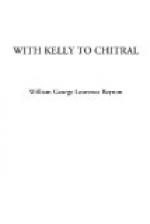On the way we met Stewart, who had just returned from his coolie hunt, and was seated on a rock, like Rachel mourning for her children, only in his case he was murmuring, not because the guns were not, but because they were back in Ghizr. “His guns were going over that pass even if he had to carry them himself, you may bet your boots on that! and begad, I’ll set the gunners to cut a road; and d’ye think now the snow would bear the mules at night when it was frozen at all?”
We got back to the huts we had left in the morning by 8.30 P.M., and there was a general demand for something hot. Our servants, luckily, had been sent back straight, so it was not long before we had something to eat; that was our first meal since 5.30 A.M., and it was now about 9 P.M. We had marched some sixteen miles through snow, and been on foot for some fifteen hours, and here we were back in the same place we had started from. Since midday we had been pretty well wet through, and the wind and cold had peeled the skin off our faces till it hung in flakes; still we were lucky in having a roof over our heads, as it had now started to snow in earnest. After dinner we weren’t long before turning in.
We were up early the next morning, but Stewart and Gough were up still earlier, and were making sledges and trying experiments with loads. They came in flushed with success, swearing that they had dragged the whole ammunition of the guns by themselves across half a mile of snow, and that they would have the guns over the pass in no time. Unluckily, the snow was still falling, and as Borradaile had all the available coolie transport, we were forced to wait till he could send it back. By noon he sent in a letter by one of the levies, saying he had been unable to start, as heavy snow was still falling, but would try the next day.
Shah Mirza now came up to me and said that there was a mullah in the village who had an infallible charm for stopping the snow, and a present of a few rupees would no doubt set it in motion. I promptly inquired how it was the mullah was not carrying a load, but was told he was too old to help in that way, but would be only too delighted to overcome the elements; so I gave the Mirza to understand that if the mullah would stop the snow-storm the Sirkar would make him, the mullah, a great man; in the meantime, I would give him a couple of rupees on account. Shah Mirza went off joyfully, evidently having implicit faith in the mullah.
Shortly after this, Gough came up, saying that the Kashmir troops in the post had volunteered to make a road through the snow, and if he could take fifty of them with four days’ rations to Teru, a sufficient track might be made to Langar, our next camping ground, just this side of the pass, to enable the guns to be carried there without much difficulty. Colonel Kelly’s permission having been obtained, we set about collecting all the shovels and spades we could find in the village. Among others I got hold




